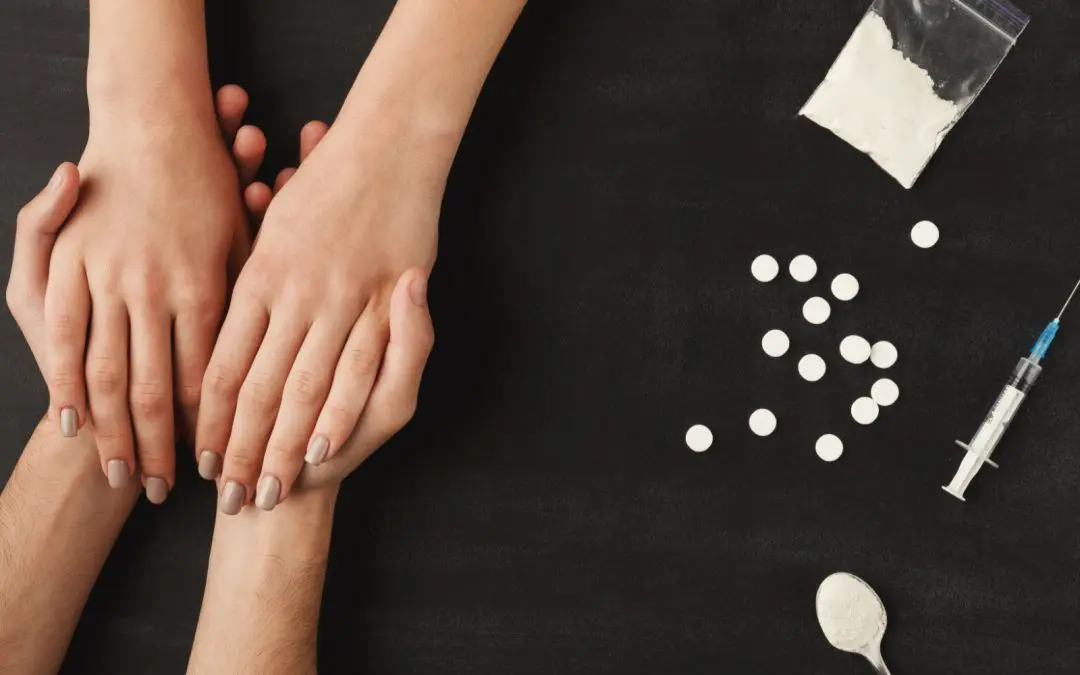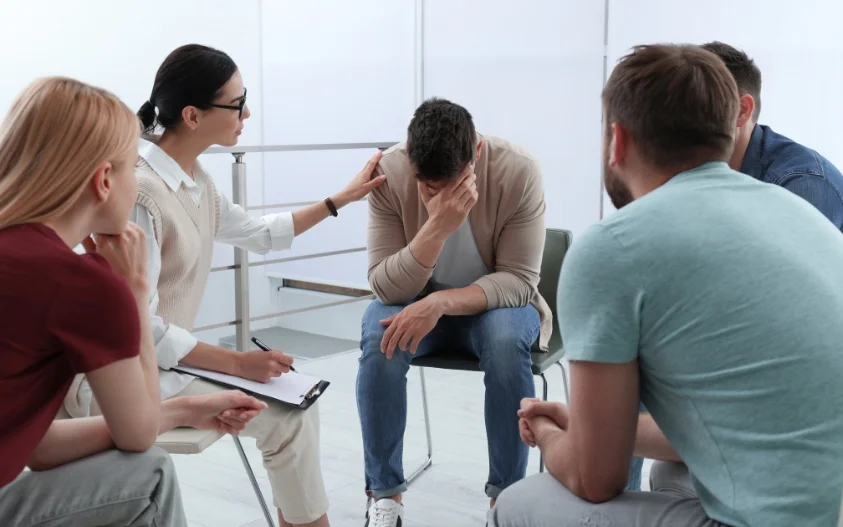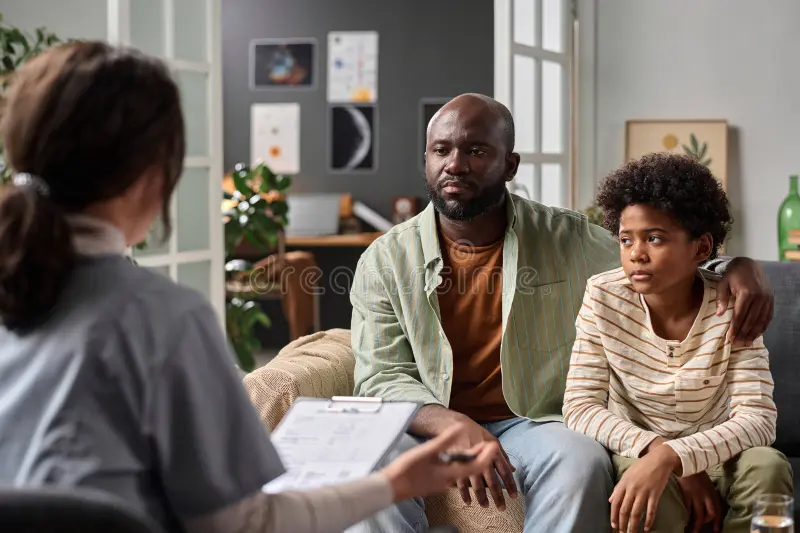24/7 Helpline:
(866) 899-221924/7 Helpline:
(866) 899-2219
Learn more about PTSD Treatment centers in Blount County

Other Insurance Options

BHS | Behavioral Health Systems

UMR

Health Partners

Aetna

Regence

Private insurance

Humana

ComPsych

Access to Recovery (ATR) Voucher

Horizon Healthcare Service

AllWell

Sutter

WellPoint

GEHA

Multiplan

Lucent

PHCS Network

Carleon

Excellus

Health Choice

Avita Community Partners
Avita Community Partners, located in Cleveland, Georgia, offers addiction treatment through drug reh...

Otsego County Mental Health Clinic
Otsego County Mental Health Clinic is an outpatient rehab located in Oneonta, NY. Otsego County Ment...

RSS – Rehabilitation Support Services
Rehabilitation Support Services (RSS) includes OMH-licensed residential group homes, licensed and su...

Stella Maris
Stella Maris in Cleveland, Ohio is an accredited addiction treatment center for men and women. They ...

MetroHealth System – Inpatient
MetroHealth System – Inpatient is a co-occurring substance use disorder treatment center in Clevelan...

Rosary Hall – St Vincent Charity
Rosary Hall – St Vincent Charity is a non-profit rehab located in Cleveland, Ohio. Rosary Hall – St ...

Community Action Against Addiction
Community Action Against Addiction is a drug and alcohol rehab located in Cleveland, Ohio. The cente...

Bellefaire Jewish Childrens Bureau
Bellefaire Jewish Childrens Bureau is a private rehab located in Cleveland, Ohio. Bellefaire Jewish ...

Community Assessment and Treatment
Community Assessment and Treatment is a private rehab located in Cleveland, Ohio. Community Assessme...

Murtis Taylor Human Services System – Detroit Avenue
Murtis Taylor Human Services System - Detroit Avenue provides settlement house and adult and childre...

TKC Turning Point
Terrence Kelleman Counseling is a private rehab located in Cleveland, OH. Terrence Kelleman Counseli...

FrontLine Service
FrontLine Service is a traditional rehab located in Cleveland, OH. FrontLine Service specializes in ...

Women’s Recovery Center
Women’s Recovery Center is a private rehab located in Cleveland, Ohio. Women’s Recovery Center speci...

CenterPoint Treatment
CenterPoint Treatment is a private rehab located in Cleveland, Ohio. CenterPoint Treatment specializ...

Recovery Resources – Pearl Road
Recovery Resources - Pearl Road is a nonprofit community-based behavioral healthcare organization th...

Key Decisions – Positive Choices
Key Decisions – Positive Choices is a private rehab located in Cleveland, Ohio. Key Decisions – Posi...

Murtis Taylor Human Services System – 105th Street
Murtis Taylor Human Services System - 105th Street provides settlement house and adult and children'...

Cleveland Treatment Center
Cleveland Treatment Center is located in Cleveland, Ohio. Cleveland Treatment Center was incorporate...

Hitchcock Center for Women
Hitchcock Center for Women is a drug and alcohol rehab located in Cleveland, Ohio. They provide resi...

Broadbent Group
Broadbent Group is a private rehab located in Cleveland, Ohio. Broadbent Group specializes in the tr...

Murtis Taylor Human Services System – Fulton Road
Murtis Taylor Human Services System - Fulton Road provides settlement house and adult and children's...

Cleveland Rehabilitation
Cleveland Rehabilitation is a private rehab located in Cleveland, Ohio. Cleveland Rehabilitation spe...

Community Assessment Foundation
Community Assessment Foundation is a private rehab located in Cleveland, Ohio. Community Assessment ...

Centers for Families and Children – East Office
Centers for Families and Children – East Office is a private rehab located in Cleveland, Ohio. Cente...

Hispanic UMADAOP – Miguel Prieto Treatment Services
Hispanic UMADAOP - Miguel Prieto Treatment Services provides an individualized treatment program for...

Harbor Light – Outpatient Program
Harbor Light - Intensive Outpatient Program is a non profit rehab located in Cleveland, OH. Harbor L...

Murtis Taylor Human Services System – Union Avenue
Murtis Taylor Human Services System - Union Avenue provides settlement house and adult and children'...

Murtis Taylor Human Services System – 13402 Kinsman Road
Murtis Taylor Human Services System - 13402 Kinsman Road provides settlement house and adult and chi...

Abraxas Cleveland Counseling Center
The Abraxas Counseling Center, located just outside of downtown Cleveland on the RTA bus line, serve...

Stella Maris – 1302 Washington Ave
Stella Maris - 1302 Washington Avenue is a non-profit rehab located in Cleveland, Ohio. Stella Maris...

National Youth Advocate Program – Cleveland
National Youth Advocate Program (NYAP) is committed to the well-being of those we serve and provide ...

Edna House
Edna House is a non-profit rehab located in Cleveland, Ohio. Edna House specializes in the treatment...

Asurgent Health – Addiction Treatment Center
Asurgent Health – Addiction Treatment Center is a drug and alcohol treatment center located in Cleve...

Homeless Mental Health Services
Homeless Mental Health Services is a private rehab located in Cleveland, Ohio. Homeless Mental Healt...

Volunteer Behavioral Health – Hiwassee Mental Health Center
Volunteer Behavioral Health - Hiwassee Mental Health Center is located in Cleveland, Tennessee. Volu...








Hope House
Since 2000, Hope House has been a faith-based rehab center in Oneonta, Alabama, that treats homeless...

Cornerstones Counseling Center
Cornerstones Counseling Center is a private rehab located in Cleveland, Georgia. Cornerstones Counse...

Shiloh Counseling and Recovery
Shiloh Counseling and Recovery is a private rehab located in Cleveland, Georgia. Shiloh Counseling a...

Legacy House Counseling
Legacy House Counseling is a private rehab located in Hayden, Idaho. Legacy House Counseling special...

AA – Alcoholics Anonymous
AA – Alcoholics Anonymous is a private rehab located in Cleveland, Mississippi. AA – Alcoholics Anon...

RSS – Rehabilitation Support Services – Elm Street Residence
Rehabilitation Support Services (RSS) - Elm Street Residence is a mental health community residence....

ORCA House – Women’s Residential
ORCA House - Women's Residential provides hope, caring and recovery services to men, women and famil...

Community Assessment and Treatment Services
Community Assessment and Treatment Services is a private rehab located in Cleveland, Ohio. Community...

ORCA House
ORCA House provides hope, caring and recovery services to men, women and families suffering from alc...

Murtis Taylor Human Services System – 13422 Kinsman Road
Murtis Taylor Human Services System - 13422 Kinsman Road provides settlement house and adult and chi...

Associates For Family and Individual Counseling
Associates For Family and Individual Counseling is a private rehab located in Cleveland, Ohio. Assoc...

Murtis Taylor Human Services System – Saint Clair Avenue
Murtis Taylor Human Services System - Saint Clair Avenue provides settlement house and adult and chi...

Scarborough Hall
Scarborough Hall is a private rehab located in Cleveland, Ohio. Scarborough Hall specializes in the ...

AA – Alcoholics Anonymous – 12th street
AA – Alcoholics Anonymous – 12th street is a non-profit rehab located in Cleveland, Ohio. AA – Alcoh...

Fresh Start Halfway House
Fresh Start Halfway House is a private rehab located in Cleveland, Ohio. Fresh Start Halfway House s...

Alternatives Agency
Alternatives Agency is a private rehab located in Cleveland, Ohio. Alternatives Agency specializes i...

The Ed Keating Center – The Rock
The Ed Keating Center - The Rock at West 117th St. has rooms for group meeting and a section housing...

Fresh Start
Fresh Start is a private rehab located in Cleveland, Ohio. Fresh Start specializes in the treatment ...

Hope Unlimited
Hope Unlimited is a private rehab located in Cleveland, Ohio. Hope Unlimited specializes in the trea...

Signature Health – ORCA House
ORCA House - Men's Residential provides hope, caring and recovery services to men suffering from alc...

Village Network – Cleveland
Village Network – Cleveland is a private rehab located in Cleveland, Ohio. Village Network – Clevela...

PEP – Greenview Day Treatment Center
PEP – Greenview Day Treatment Center is a private rehab located in Cleveland, Ohio. PEP – Greenview ...

Recovery Resources – Chester Avenue
Recovery Resources - Chester Avenue is a nonprofit community-based behavioral healthcare organizatio...

Cleveland Christian Home – Residential Treatment
Cleveland Christian Home – Residential Treatment is a non-profit drug and alcohol rehab located in C...

Bridgeway The UNBAR
Bridgeway The UNBAR is a private rehab located in Cleveland, Ohio. Bridgeway The UNBAR specializes i...

Unity Crusade Against Drugs
Unity Crusade Against Drugs is a private rehab located in Cleveland, Ohio. Unity Crusade Against Dru...

Northcoast Behavioral – Community Support Network
Northcoast Behavioral – Community Support Network is a public rehab located in Cleveland, Ohio. Nort...

Substance Abuse Initiative of Greater Cleveland
Substance Abuse Initiative of Greater Cleveland is a private rehab located in Cleveland, Ohio. Subst...

VA Northeast Ohio Healthcare System – McCafferty VA Outpatient Clinic
McCafferty VA Multi-Specialty Outpatient Clinic provides primary health care to eligible veterans us...

Hispanic UMADAOP
Hispanic UMADAOP is a drug and alcohol rehab located in Cleveland, Ohio. This facility provides inpa...

Murtis Taylor Human Services System – Project Avenue
Murtis Taylor Human Services System - Project Avenue provides settlement house and adult and childre...

Center For Interpersonal
Center For Interpersonal is a private rehab located in Cleveland, Ohio. Center For Interpersonal spe...

Northern Ohio Recovery Association
Northern Ohio Recovery Association is a private rehab located in Cleveland, Ohio. Northern Ohio Reco...

Re – Entry Addiction Prevention
Re – Entry Addiction Prevention is a private rehab located in Cleveland, Ohio. Re – Entry Addiction ...

Huron Hospital – Behavioral Medicine
Huron Hospital – Behavioral Medicine is a private rehab located in Cleveland, Ohio. Huron Hospital –...

East Cleveland Straight Talk
East Cleveland Straight Talk is a private rehab located in Cleveland, Ohio. East Cleveland Straight ...

Carrington Youth Academy
Carrington Youth Academy, located in Cleveland, Ohio, provides outpatient behavioral health and addi...

Mainline Striping Drug Addiction Treatment Center
Mainline Striping Drug Addiction Treatment Center is a private rehab located in Cleveland, Ohio. Mai...

Beech Brook – Outpatient
Beech Brook – Outpatient is a private rehab located in Cleveland, Ohio. Beech Brook – Outpatient spe...

PEP – Phoenix Day Treatment Center
PEP – Phoenix Day Treatment Center is a private rehab located in Cleveland, Ohio. PEP – Phoenix Day ...

New Visions
New Visions is a private rehab located in Cleveland, Ohio. New Visions specializes in the treatment ...

Hispanic Serenity Group – AA – Alcoholics Anonymous
Hispanic Serenity Group – AA – Alcoholics Anonymous is a non-profit rehab located in Cleveland, Ohio...

Bridgeway Steer Straight Program
Bridgeway Steer Straight Program is a private rehab located in Cleveland, Ohio. Bridgeway Steer Stra...

Connections
Connections is dedicated to the diagnosis and treatment of mental illness and chemical dependency, a...

The Ed Keating Center – Jones Road
The Ed Keating Center - Jones Road is their original sober living facility for 85 men, including som...

AA – Alcoholics Anonymous – 188th street
AA – Alcoholics Anonymous – 188th street is a non-profit rehab located in Cleveland, Ohio. AA – Alco...

Allied Behavioral Health Services
Allied Behavioral Health Services is a private rehab located in Cleveland, Ohio. Allied Behavioral H...

Ohio Guidestone
Ohio Guidestone is a private rehab located in Cleveland, Ohio. Ohio Guidestone specializes in the tr...

Connections – North Ridge Commons
Connections - North Ridge Commons is dedicated to the diagnosis and treatment of mental illness and ...

YouthCare of Oklahoma
YouthCare of Oklahoma is an outpatient clinic that provides mental health and substance use treatmen...

Lee University – Marriage Therapy
Lee University – Marriage Therapy is a private rehab located in Cleveland, Tennessee. Lee University...

Camelot Care Centers – Cleveland
Camelot Care Centers – Cleveland is a private rehab located in Cleveland, Tennessee. Camelot Care Ce...

Youth Counseling Services
Youth Counseling Services is a private rehab located in Cleveland, Tennessee. Youth Counseling Servi...

AA – Alcoholics Anonymous – Camel Group
AA – Alcoholics Anonymous – Camel Group is a non-profit rehab located in Cleveland, Texas. AA – Alco...

AA – Alcoholics Anonymous
AA – Alcoholics Anonymous is a non-profit rehab located in Cleveland, Texas. AA – Alcoholics Anonymo...


















































